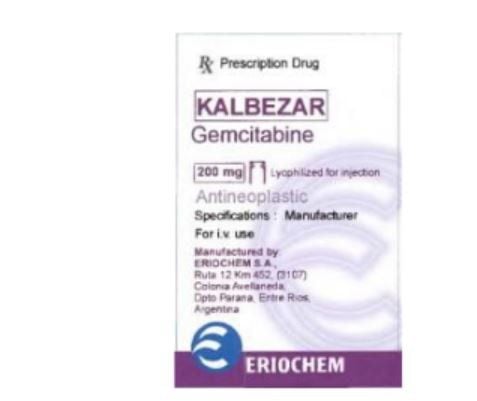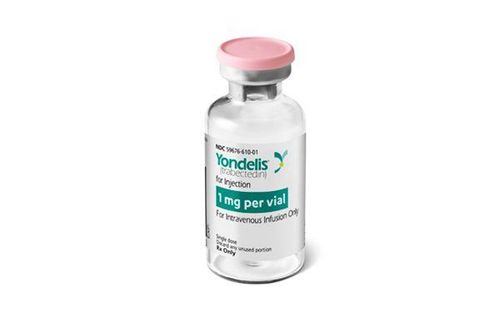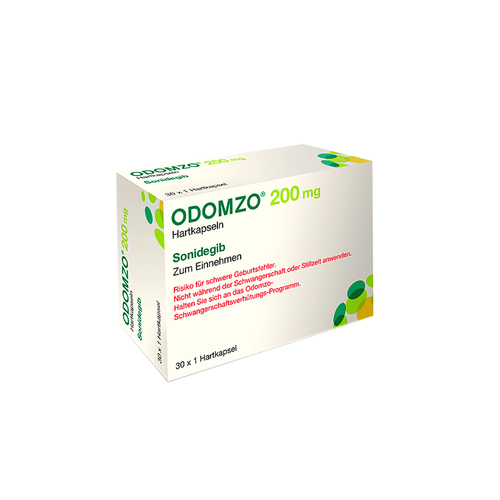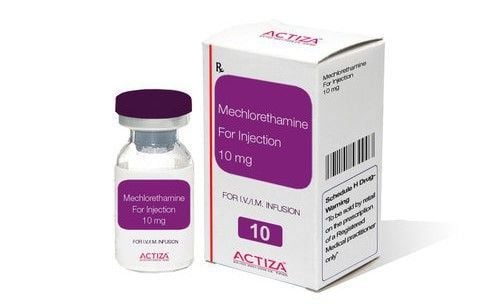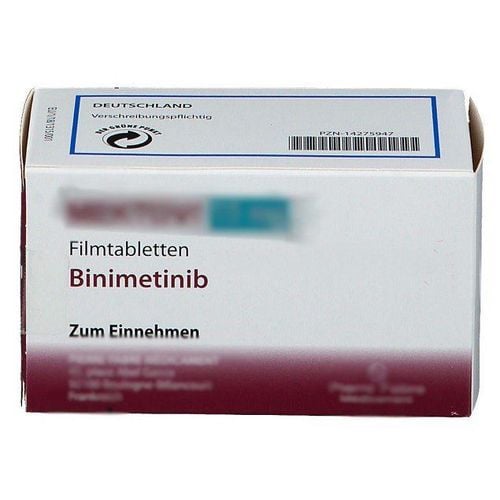This is an automatically translated article.
Encorafenib or Braftovi is used in combination with a medicine called binimetinib to treat melanoma (skin cancer) that cannot be treated with surgery or has spread to other parts of the body or in combination with cetuximab (Erbitux) to treat colorectal cancer that has spread to other parts of the body. Learn about the uses of Encorafenib through the article below.
1. Uses of Encorafenib
Encorafenib or Braftovi contain the active ingredient Encorafenib, which is available in capsule form, taken orally and used to treat cancer.Encorafenib is manufactured by the company ARRAY Biopharma. This is a large pharmaceutical company, which provides effective treatment drugs.
Encorafenib is only used if your cancer has a specific genetic marker (an abnormal “BRAF” gene).
Encorafenib Active ingredient: Encorafenib 75mg
Specification: 90 capsules
Origin: Array BioPharma
Encorafenib is used together with binimetinib (Mektovi) to treat certain types of melanoma (a type of skin cancer) that have metastasized. spread to other parts of the body or cannot be removed by surgery. It is also used with cetuximab (Erbitux) to treat a certain type of colon cancer in adults that has spread to other parts of the body after other treatment(s).
Encorafenib is in a class of drugs called kinase inhibitors. It works by blocking the activity of the abnormal protein that signals cancer cells to multiply. This helps stop or slow the spread of cancer cells.
In tumors with the BRAF V600 mutation, an abnormal form of the BRAF protein switches to another protein called MEK involved in the stimulation of cell division. The active ingredient in Braftovi, encorafenib, works by blocking the BRAF protein. Thus blocking the activation of cell division and slowing the growth and spread of cancer.
2. How to use Encorafenib
Encorafenib comes in capsule form for oral administration. It is usually taken with or without food once per day. Take encorafenib at the same time each day. Follow the directions on your medicine label carefully and ask your doctor or pharmacist to explain any part you do not understand. Take encorafenib exactly as directed. Do not take more or less or take it more often than prescribed by your doctor.
If you vomit after taking the medicine, do not take another dose. Continue your usual dosing schedule.
Your doctor may reduce or stop your treatment temporarily or permanently depending on whether you experience any side effects. Be sure to tell your doctor how you feel during treatment with encorafenib.
Here's how to use Encorafenib:
Take after meals. Take encorafenib exactly as prescribed. Swallow encorafenib capsules whole. Do not crush or dissolve the tablets. Do not change the patient's dose or stop encorafenib unless directed by the treating physician. If the patient misses a dose, take it as soon as you remember. If it is less than 12 hours until the next dose, skip the missed dose and return to the patient's normal dosing time. Do not take more than 1 dose of encorafenib at a time. Call a doctor at once if too much is used. The amount of encorafenib you will receive depends on many factors, including your height and weight, your general health or other health problems, and the type of cancer or condition you have. Your doctor will determine the exact dose and schedule for
This medicine may be prescribed for other uses; Ask your doctor or pharmacist for more information on usage.
3. Contraindications of Encorafenib
You should not use encorafenib if you are allergic to it. Tell a specialist if you have ever:
Have heart problems; Long QT syndrome (in you or a family member); Lung disease; Liver or kidney disease; eye problems (especially problems with your retina); or Bleeding or blood clot problems. Although encorafenib is used to treat melanoma, using encorafenib may increase your risk of developing other types of skin cancer. Tell your doctor if you notice any new skin symptoms such as redness, warts, sores that don't heal, or moles that change in size or color.
You may need to have a negative pregnancy test before starting this treatment.
Do not use encorafenib if you are pregnant. It can harm an unborn baby. Use effective birth control to prevent pregnancy while you are using this medicine and for at least 2 weeks after your last dose. Tell your doctor if you are pregnant.
Encorafenib can make hormonal birth control less effective, including birth control pills, injections, implants, skin patches, and vaginal rings. To prevent pregnancy while using encorafenib, use a barrier form of birth control: a condom, diaphragm, cervical cap, or sponge.
This medicine may affect fertility (ability to have children) in men.
Do not breast-feed while using this medicine and for at least 2 weeks after your last dose.
4. Notes when using Encorafenib
Drug interactions can change the way a drug works or increase the risk of serious side effects. Keep a list of all the products you use (including prescription/nonprescription drugs and herbal products) and share it with your doctor and pharmacist.
Contact a doctor when: Fever of 100.4o F (38o C) or higher, chills (possibly signs of infection)
Symptoms requiring medical attention:
Nausea (affects) to the ability to eat and not to conform to the prescribed medication) Vomiting (vomiting more than 4-5 times in 24 hours) Diarrhea (4-6 episodes in 24 hours) New warts, skin sores or red bumps bleeding or not healing Change in the size or color of a mole Sudden vision changes or other vision changes Blurred vision Red eyes Unusual bleeding or bruising Black or black stools or blood in your stools Blood in the urine (hematuria) Coughing up blood or vomit that looks like coffee grounds Bleeding gums Any bleeding that is very heavy or you can't stop Mood changes Confusion Muscle pain or weakness Heart rate unusual or fast heartbeat Decreased appetite or very upset stomach Increased thirst or hunger Rapid breathing Extreme fatigue (inability to perform self-care activities) Any skin changes, irritation , itchy or rash Always notify your doctor if you experience any unusual symptoms.
Do not start, stop or change the dosage of any medicine without your doctor's approval.
Other drugs may affect the removal of encorafenib from your body. This may affect how encorafenib works. Examples include azole antifungals (such as itraconazole, ketoconazole). Macrolide antibiotics (such as erythromycin), rifamycins (such as rifampicin, rifabutin), St. John's wort. Medicines used to treat seizures (such as carbamazepine, phenytoin), among others.
5. Encorafenib side effects
Most people will not experience all of the side effects of encorafenib listed. Encorafenib side effects are generally predictable in terms of their onset, duration, and severity. Encorafenib side effects should improve after therapy ends.
Encroafenib side effects can be quite manageable. There are many options to minimize or prevent the side effects of encorafenib. Here are some possible side effects when using Encorafenib:
Fatigue Nausea and vomiting Abdominal pain Joint pain Increased serum creatinine (monitor with other nephrotoxic drugs)
6. How to store Encorafenib
Store in a cool, dry place. The temperature should not exceed 30°C. Avoid direct sunlight. Keep out of reach of children and pets.
Please dial HOTLINE for more information or register for an appointment HERE. Download MyVinmec app to make appointments faster and to manage your bookings easily.
References: reference.medscape.com, medicines.org.uk, chemocare.com




